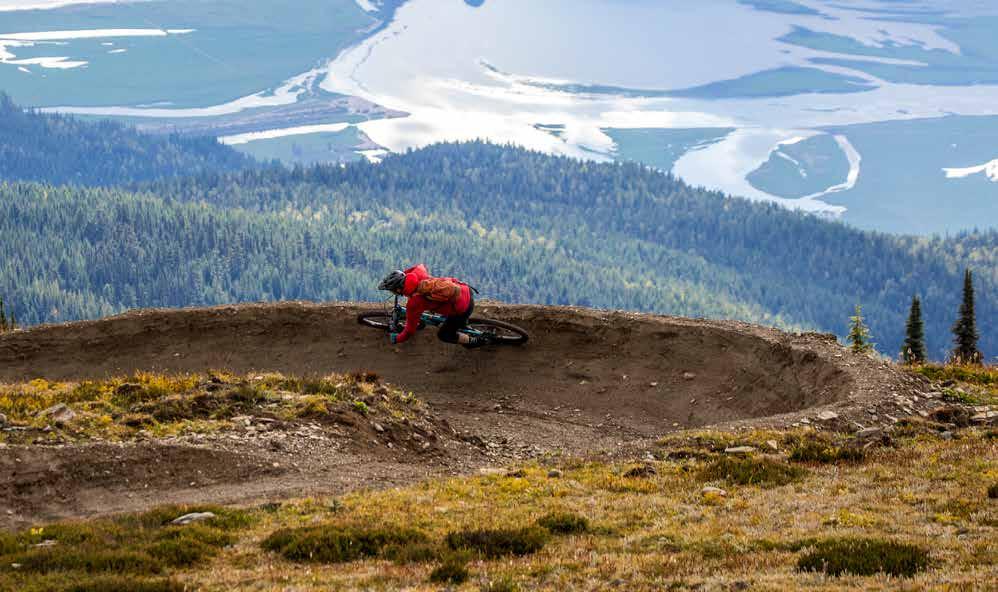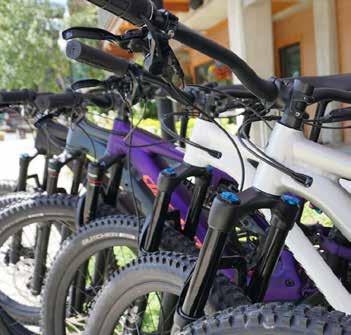
12 minute read
Overdose crisis in Revy. p
A single mom juggling the demands of parenting with a full-time job, you’d never guess Lisa (not her real name) is a recovering heroin addict. Born and raised in Revelstoke, she began using cocaine and crystal meth while still in high school. She didn’t even try heroin until she was well into her 30s.
“Drugs have been around [Revelstoke] for a long time. I think a lot of people started getting into them in high school, and I know that’s still true to this day,” said Lisa. “When I was in high school, drugs were really big.”
Lisa says she wasn’t even aware heroin was in Revelstoke until someone she knew had some, and offered to let her try. Three weeks after using heroin for the first time, Lisa says she was hooked. At first, she was able to maintain her regular life — picking her kids up from school, attending
Revelstoke Emergency Health Services, RCMP see rise in drug-related calls, investigations
In the first six months of 2020, BC Emergency Health Services paramedics in Revelstoke responded to a total of 10 overdose calls. By comparison, BCEHS paramedics responded to 10 overdose calls in Revelstoke for all of 2016; 17 calls in all of 2017; 18 calls in all of 2018; and 16 calls for all of 2019. According to BCEHS communications officer Shannon Miller, when BCEHS paramedics respond to a potential overdose patient, that patient has a 99 per cent chance of survival.
“While tracking this BCEHS overdose data can be useful to identify trends, it’s important to consider that it may not capture all opioid overdoses and also includes alcohol intoxication and poisoning ingestions,” said Miller.
For context, said Miller, there were a total of 24,166 parent teacher association meetings and showing up for work. All while using heroin. All day. Every day.
“Nobody knew. It’s not what people think. It’s not that junkie sitting on [East] Hastings. It’s soccer moms. It’s every day people, and they’re completely functioning addicts. I couldn’t even have a shower until I had my shot, but once I had it, BOOM!, I’m on top of the world. I could do anything.”
Lisa says a point of heroin costs $20. At the height of her addiction she was spending a minimum of $100 a day on heroin.
“It got to the point where I needed way more than (a point) to do in one shot. It gets pricey fast. I know a lot of friends that turned to prostitution. I know people who have
A LOOK INSIDE REVELSTOKE’S OPIOID EPIDEMIC
A RECENT BC CORONERS SERVICE REPORT LISTED REVELSTOKE AMONG LOCAL HEALTH AREAS WITH THE HIGHEST RATES OF DRUG OVERDOSE DEATHS. WE SPOKE WITH STAKEHOLDERS TO FIND OUT WHAT’S BEING DONE TO COMBAT A DRUG PROBLEM THAT REMAINS LARGELY UNSEEN BY THE GENERAL PUBLIC.
By Melissa Jameson.
committed robbery here to get their drugs.” potential overdose or poisoning events in all of B.C. in 2019. This means BCEHS paramedics are responding to an average of 66 potential overdose/poisoning calls per day in the province. Vancouver, the largest centre for overdoses, averages about 23 overdose calls a day to BCEHS paramedics.
Similarly, the Revelstoke RCMP has also seen an increase in statistics, in this case for illicit drug related offence investigations and impaired driving offence investigations. The RCMP provided first-quarter statistics for 2018, 2019 and 2020. According to those statistics, Revelstoke RCMP conducted 10 impaired driving investigations in the first quarter of 2018, 11 in 2019 and 45 in 2020. There were 18 drug-related investigations during the first quarter of 2018, six in 2019 and 18 during the first quarter of 2020.
The statistics don’t necessarily provide the whole picture, said Revelstoke RCMP Sgt. Chris Dodds, because police can only report on actual investigations that have corresponding file numbers. Dodds told the Mountaineer there are a number of ways investigations can be initiated including through calls for service, Crime Stoppers tips, spin-off investigations from other calls for service and selfgenerated investigations by RCMP officers.
In early June the BC Coroners Service published a report listing Revelstoke among local health areas with the highest rates of illicit drug toxicity deaths in the province. Revelstoke was third worst in the province, behind only Hope, B.C. and Vancouver. According to statistics provided in the report, there were a total of nine overdose deaths in Revelstoke between January 2018 and the end of May 2020. Of those fatalities, six happened in 2018 and the remaining three occurred in May 2020.
The Revelstoke
Mountaineer Magazine, and its sister publication revelstokemountaineer.com, has followed Revelstoke’s opioid crisis since breaking the story of the 2018 overdose deaths. Following news of the most recent deaths,
revelstokemountaineer.com
reached out to stakeholders to try and get a sense of what’s being done to combat the ongoing crisis. In an attempt to dive even deeper into the conversation,
Revelstoke Mountaineer
Magazine has reached out to a broader range of stakeholders, including a recovering heroin and opiod addict, in an effort to better understand the impacts the ongoing opioid epidemic is having on the community, and what’s being done about it. Here’s what we found out.
“As an example, our impaired driving has increased this quarter, and the increase is likely tied to specific [police officers] receiving training in impaired driving enforcement and detection. The spike may not directly correlate to an increase in impaired driving by the public, but due to increased enforcement as a result of training,” said Dodds.
Despite potency and risk of overdose, drug users want fentanyl
Lisa describes Revelstoke’s drug scene as huge and scary. Even more so now, says Lisa, because no one knows for sure what’s in the drugs they’re consuming.
“Everything’s being cut with fentanyl. It’s intense what goes on in the background,” said Lisa. “There’s drug wars, and for a small town you wouldn’t think that’s happening, but it is. People have territory, but pretty much you can find anything you want here and that’s the scary thing. It’s really scary because now you don’t know what it’s being cut with.”
Lisa says while there are numerous people selling cocaine and meth in Revelstoke, there are only a handful of heroin dealers. In her opinion, the overdose deaths in 2018 and May 2020 were likely the fault of “bad batches” coming into town. The limited number of people selling heroin. or ‘down,’ meant the potential for overdose increased because essentially everyone was purchasing drugs from the same batch.
Despite the potential for overdose and even death, Lisa said drug users actually want fentanyl, because it’s far more potent than heroin.
“It was, ‘The more the better.’ You get into that head space of, ‘if you OD and die, well, oh well.’ You don’t care. I know that was my mentality for a long time. It didn’t matter if I died from the next shot, I was OK with that. Part of me wanted to, because it’s so hard to get out of it. It starts to control your whole life. The fentanyl doesn’t scare people when they’re using it, not at all. I mean, I’ve done plenty of fentanyl and I’ve never died.”
In a story published on the revelstokemountaineer.com, Chloe Sage, a drug checking coordinator with ANKORS in Nelson, said fentanyl isn’t the only dangerous opiod showing up in the drug supply. On May 26, 2020 ANKORS released a community-wide warning for the Nelson area after drug testing showed yellow samples being sold as ‘down’ were found to contain benzodiazepines and fentanyl.
“People are getting knocked out. They’re not only dealing with an overdose, but they’re also doing their shot and then blacking out for hours. They’re getting robbed, getting assaulted, sexually assaulted … It’s very concerning for us to be seeing this in our region,” said Sage. “To do a shot and think you’re just going to carry on and then to wake up two hours later in an alley, that’s really scary.”
Impacts of COVID-19 physical distancing on opioid epidemic still unknown
April 2020 marked four years since now former provincial health officer Dr. Perry Kendall declared a public health emergency due to the significant increase in drug-related overdoses and deaths being seen across B.C.
Roger Parsonage, executive director of clinical operations for Interior Health, said prior to the onset of COVID-19, the health authority had started seeing gains in its efforts to combat the opioid epidemic. That was before the BC Coroners Service released its most recent reports, showing a spike in the number of overdose deaths. Those most recent overdose deaths took place during a call for provincial-wide physical distancing due to the coronavirus, which saw many people self-isolating in their homes.
Parsonage said it’s still unknown what impact COVID-19 may have on efforts to reduce opioid-related deaths and overdoses in the province.
“We don’t know for sure if control measures like physical distancing may have had a negative effect on people who are already isolated and stigmatized due to substance use,” said Parsonage.
Jennifer Brunelle, project lead for the new Shared Car BC Adult Mental Health and Substance Use project in Revelstoke, told the Mountaineer that the pandemic has amplified some root problems that lead to overdose deaths: “In Revelstoke and elsewhere, the COVID-19 pandemic has increased isolation for individuals and complicated access to health and social services for many.”
How Revelstoke is working to reduce stigma, provide help
The judgement and the stigma, says Lisa, are the hardest parts of being an addict. Talking to stakeholders in the community, it’s obvious they all want to help. Getting a clear idea of what that help looks like, however, is a bit more complicated. There appear to be many moving parts, but it’s not always clear how each piece fits together to foster a sustained systemic response.
Interior Health
Parsonage said Interior Health is continuing to provide harm reduction services along with treatment and support. This includes a drug and alcohol counsellor through Revelstoke Mental Health and Addictions, access to Opioid Antagonist Treatment, and a harm reduction nurse who is able to provide naloxone kits. Recently, in light of the numerous warnings about illicit drug contamination, IH began including drug testing strips with the naloxone kits.
Asked about IH’s decision to include the testing strips, Lisa says she isn’t sure it would make much difference for drug users.
“I think it’s great they’re doing that but I don’t know how effective it will be because by that time you’ve already paid for your drugs. You get them tested and ‘oh, there’s something in it,’ but these are all the drugs I have, so I’m just going to do them anyway. I just can’t see people doing it and then not consuming the drugs anyway,” she said.
In addition to providing naloxone kits and testing strips, Interior Health is also actively promoting Lifeguard, an app that, when enabled, connects a user to emergency responders if the user becomes unconscious or unable to function. Parsonage said IH is even going as far as providing people who are using substances alone with phones, in order to ensure they remain as safe as possible.
The City of Revelstoke
In a statement emailed to the Mountaineer, Revelstoke Mayor Gary Sulz said the city recently awarded two contracts to Community Connections.
The first is $35,000 funded by Columbia Basin Trust, and is to support Community Connections and the Revelstoke Child and Youth Mental Health and Substance Use Collaborative with their early intervention initiatives and harm reduction. The second contract is for $33,789 through funds from the Canadian Mental Health Association. These funds are dedicated to the Community Action Initiative, which will support development of harm reduction strategies. Sulz said this funding is on top of on-going projects in partnership with the CYMHSU and the Opioid project.
Local physicians & Shared Care BC
Brunelle says although asking for help can seem daunting, those struggling with substance use can discuss support or treatment with their family physician, or through the walk-in clinic, where treatment options and care plans can be created based on individual needs.
“Revelstoke is fortunate to have a network of health care and social services providers and administrators who are actively working to enhance pathways to efficient and effective substance use and care within the community,” said Brunelle.
An example of this is a new initiative through Shared Care BC, which began locally in May 2020. The project will focus on adult mental health and substance use populations and bring together stakeholders from both local medical practices, Interior Health and Community Connections. The first phase of the project, which will focus on community engagement, patient journey mapping to help the working group better understand gaps in care, is set to begin this summer.
Revelstoke RCMP
In an email to the Mountaineer, Dodds said the Revelstoke RCMP continue to take action to reduce the supply of illicit substances in the community.
From a broader, community perspective, when it comes to addressing the issue of substance use in the community, Dodds says Revelstoke RCMP have partnered with different agencies and organizations to collaboratively deal with the ongoing opioid crisis.
“Revelstoke RCMP will continue to take actions in an effort to reduce the supply of deadly illicit substances to our community, by targeting those who traffic drugs in our town,” said Dodds.
The Revelstoke Child and Youth Mental Health & Substance Use Collaborative began its work in the community back in 2015. An initiative of Shared Care BC, the CYMHSU brought together a variety of local stakeholders from a broad spectrum of the community, including School District 19, local physicians, RCMP, the Ministry of Children and Family Development and parents. Stacie Byrne, who was CYMHSU project lead from April 2017 to December 2019, said the work done by the group has helped to identify and mitigate many gaps in service for youth struggling with mental health and substance use issues, but says there is still work that needs to be done.
“It will never end because new drugs will appear, and new problems will be presented. If we keep educating ourselves, meeting and sharing our knowledge, and building relationships with those individuals directly affected and their families and friends we can stay ahead of the need and work to be proactive as well as reactive,” Byrne wrote in an email to the Mountaineer.
Lisa’s message to those who struggle with substance use and addiction is simple: Don’t give up.
“People need to know you’re not always going to get it right on the first try. It’s [recovery] not always linear or easy. Walking into [a Narcotics Anonymous meeting] for the first time can feel really scary, but people there will welcome you.”
Information on Narcotics Anonymous and Alcoholics Anonymous meetings, along with other local supports for those struggling with substance use, can be found by visiting revelstokelife.ca.
RENTALS | REPAIRS | GEAR & APPAREL

Revelstoke Mountain Resort is your one-stop-shop for all things mountain biking.


revelstokemtn.com/mtb
Local. Independent.





